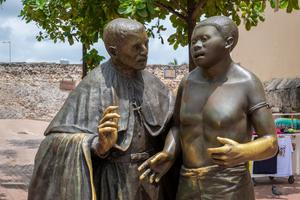Patriarch to Pope: ‘You Preach With Words, but Above All With Love’
Ecumenical Patriarch Bartholomew I praised how Pope Francis exercises his Petrine ministry as the head of the Catholic Church.

ISTANBUL — Ecumenical Patriarch Bartholomew I of Constantinople, the spiritual leader of the Orthodox Church, lauded the humble manner in which Pope Francis exercises his Petrine ministry and urged their Churches to focus on the future of dialogue.
“Your Holiness, your hitherto brief tenure at the helm of your Church has already manifested you in people’s conscience today as a herald of love, peace and reconciliation,” the patriarch told the Pope on Nov. 30.
“You preach with words, but above and beyond all with the simplicity, humility and love toward everyone that you exercise your high ministry. You inspire trust in those who doubt; hope in those who despair; anticipation in those who expect a Church that nurtures all people.”
In addition, Patriarch Bartholomew lauded Pope Francis for offering his Orthodox brothers and sisters the aspiration of continuing to build lasting harmonious relations built on their common tradition.
The patriarch offered his words to the Pope during the Nov. 30 celebration of the Divine Liturgy honoring the feast of St. Andrew, patron and founder of the Orthodox Churches.
It also fell on the final day of Pope Francis’ three-day apostolic voyage to Turkey, which was made largely upon the invitation of the patriarch to participate in the festivities for St. Andrew’s feast.
Bartholomew told the Pope that the obligation of dialogue isn’t just limited to the past, but must extend into the future, particularly modern times: “For what is the value of our fidelity to the past unless this denotes something for the future?”
“What is the benefit of boasting for what we have received unless these translate into life for humanity and our world both today and tomorrow?” he asked, explaining that the Church of Jesus Christ does not exist just for itself, but rather for the world and all of humanity.
In the midst of so many current divisions and conflicts, many carried out in the name of religion, as well as the tragic phenomena of poverty, human trafficking and damage done to the planet as a result of greed, the world ought to be concerned for the future of itself, too, the patriarch noted.
Neither science nor politics will solve these problems or guarantee the future, he observed, and he encouraged humanity to espouse “the message of reconciliation, love and justice,” which is the mission of the Church.
“This is precisely why the path toward unity is more urgent than ever for those who invoke the name of the great Peacemaker,” Patriarch Bartholomew said, praying that restoration of full communion between the Catholic and Orthodox Churches “will not be prolonged.”
He urged greater collaboration, saying that “we no longer have the luxury of isolated action” due to the current persecution of Christians, who are targeted regardless of which church they belong to.
“The unity that concerns us is, regrettably, already occurring in certain regions of the world through the blood of martyrdom. Together, let us extend our hand to people of our time; together let us extend the hand of him who alone can save humankind through his cross and resurrection.”
In his own personal words to the patriarch, Pope Francis noted the importance of meeting one another in a face-to-face encounter, saying that in addition to this gesture, the embrace of peace and mutual prayer for one another are essential for a dialogue seeking to advance toward communion.
“An authentic dialogue is, in every case, an encounter between persons with a name, a face, a past and not merely a meeting of ideas,” the Pope observed, and he said that this is especially true for Christians, who recognize the Person of Jesus as the truth.
Pope Francis then observed how his visit fell mere days after the 50th anniversary of the promulgation of the Second Vatican Council’s decree on ecumenism, Unitatis Redintegratio, which officially recognized the Orthodox Churches as having valid sacraments and a true apostolic succession.
To maintain the patrimony of the Eastern Churches is “an essential condition, accepted by both, for the restoration of full communion, which does not signify the submission of one to the other or assimilation,” the Pope explained.
Rather, communion means to welcome the unique gifts that each has been given, the Pope said, and he assured the patriarch that in its efforts to attain full unity, the Catholic Church doesn’t seek to “impose” any conditions other than their shared profession of faith.
“The one thing that the Catholic Church desires and that I seek as Bishop of Rome, ‘the Church which presides in charity,’ is communion with the Orthodox Churches,” he said.
A union such as this, the Pope continued, is always a fruit of the fraternal love given to us by the Holy Spirit. This love, he said, expresses the transcendent spiritual bond the Churches possess, which unites them as disciples of the Lord.
“In today’s world, voices are being raised which we cannot ignore and which implore our Churches to live deeply our identity as disciples of the Lord Jesus Christ,” the Pope noted, saying these voices are primarily those of the poor, the victims of the many conflicts throughout the world and youth.
The Holy Father concluded his address by recognizing how their two Churches are already advancing along the path to full communion and prayed that both St. Andrew and St. Peter would intercede for them in the process.
“We ask God for the great gift of full unity and the ability to accept it in our lives. Let us never forget to pray for one another.”
- Keywords:
- catholic church
- catholic-orthodox dialogue
- ecumenical patriarch bartholomew i
- ecumenism
- istanbul
- orthodox church
- papal trip
- papal visit
- petrine ministry
- pope francis
- second vatican council
- turkey
- unitatis redintegratio
- vatican














